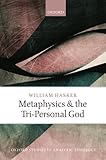Metaphysics and the tri-personal God / William Hasker.
Material type: TextSeries: Oxford studies in analytic theologyPublication details: New York : Oxford University Press, c 2013 Edition: First editionDescription: viii, 269 pages ; 25 cmISBN:
TextSeries: Oxford studies in analytic theologyPublication details: New York : Oxford University Press, c 2013 Edition: First editionDescription: viii, 269 pages ; 25 cmISBN: - 9780199681518
- 0199681511
- Metaphysics & the tri-personal God [Spine title]
- ARCH YNDC 110 H349M
- BT111.3 .H378 2013
| Item type | Current library | Collection | Call number | Status | Date due | Barcode | |
|---|---|---|---|---|---|---|---|
 Archives
Archives
|
SAIACS Archives Room | Yandell Collection | ARCH YNDC 110 H349M (Browse shelf(Opens below)) | Not for loan | 063207 |
Includes bibliographical references (pages 259-265) and index.
Introduction -- pt. 1. Trinitarian foundations. Prelude: where are the foundations? -- The "new" fourth century -- The divine three: what is a "person"? -- Gregory of Nyssa and the divine persons -- Augustine and the divine persons -- The divine oneness: what is a "nature"? -- Interlude: simplicity and identity -- The pro-Nicenes and the divine nature -- The Fathers, the Trinity, and scripture -- Postlude: are the foundations stable? -- pt. 2. Trinitarian options. Surveying the options -- Barth and Rahner: persons as modes of being -- Moltmann and Zizioulas: perichoresis and communion -- Leftow: God living three life-streams -- Van Inwagen: the Trinity and relative identity -- Brower and Rea: sameness in number without identity -- Craig: a soul with multiple sets of faculties -- Swinburne: created divine persons -- Yandell: the Trinity as a complex bearer of properties -- What have we learned? -- pt. 3. Trinitarian construction. Constructing the doctrine of the Trinity -- Monotheism and christology -- Each of the persons is God -- The trinitarian persons are persons -- The communion of the persons -- Processions in God -- The one divine nature -- Constitution and the Trinity -- The grammar of the Trinity -- The metaphysics of the Trinity.
William Hasker reviews the evidence concerning fourth-century pro-Nicene trinitarianism in the light of recent developments in the scholarship on this period, arguing for particular interpretations of crucial concepts. He then reviews and criticises recent work on the issue of the divine three-in-oneness, including systematic theologians such as Barth, Rahner, Moltmann, and Zizioulas, and analytic philosophers of religion such as Leftow, van Inwagen, Craig, and Swinburne.
There are no comments on this title.

